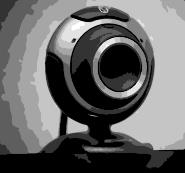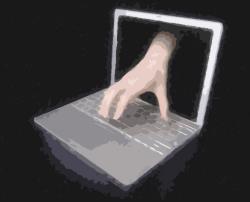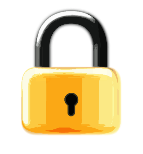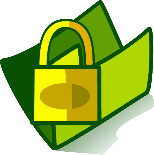Your Digital Security [2]
12 ways to stay digitally secure
1. Don't open suspicious looking attachments or emails
Especially from people you don't know as they can contain malware that can attack your computer. Music, games and videos that are downloaded from unreliable sites can be infected too.
2. Beware of webcam hackers
 The number of incidents of Webcams on tablets and laptops being hacked is increasing, so consider covering or disabling your webcam (you can use a small post it note on any Apple device webcam) or by detaching from the USB port when not in use. Look for the indicator light - many external webcams will have a red indicator light indicating when the camera is on. Laptops with internal webcams often have a blue indicator light.
The number of incidents of Webcams on tablets and laptops being hacked is increasing, so consider covering or disabling your webcam (you can use a small post it note on any Apple device webcam) or by detaching from the USB port when not in use. Look for the indicator light - many external webcams will have a red indicator light indicating when the camera is on. Laptops with internal webcams often have a blue indicator light.
Beware of accepting technical help from others (you are always welcome to speak to the IT helpdesk here at King's by email or Twitter @KingsITsystems), as this has been known to provide an opportunity for hackers to hijack your webcam. Don't keep webcams in bedrooms and bear in mind it is best not to do anything in front of a webcam (including your iPad or MacBook) you would not be happy to broadcast to the world.
3. Check your Apps' security settings
Consider carefully the potential repercussions of any functionality, terms and conditions and updates before you download any Apps that could threaten your personal security. Many fitness Apps publish your location or route as well as other details. Some Apps such as Foursquare, games, newspapers, Askfm and Spotify can post updates to your status line on other social platforms such as Facebook and Twitter by default. Revisit security settings regularly and lock down their access to your address book or other social platforms. Scrutinise the Terms and Conditions when downloading new Apps - does it have the right to read your texts or download your contacts, even send email from the accounts on your Smartphone or tablet computer without notifying you? If you are not the paying customer on these Apps, then your data is the commodity.
Do consider the use of Apps that delete any comments you made on sites such as Twitter automatically (http://imstash.com/best-twitter-tools-bulk-delete-tweets/), after a reasonable period of time such as four weeks.
4. Keep passwords private
Never share your usernames and passwords for online accounts, email or even e commerce accounts with anyone else. Try to avoid using the same passwords and usernames across multiple devices and platforms. Be sure to password protect your phone and any other devices.
 Investigate using a well reviewed App to generate and store your passwords - and use different passwords across all of the profiles and sites that you use, in order to ensure that if you are hacked, so that it difficult to hack into every site you use with the same password. This is so easy to do, if you use the right Apps, essential for online security.
Investigate using a well reviewed App to generate and store your passwords - and use different passwords across all of the profiles and sites that you use, in order to ensure that if you are hacked, so that it difficult to hack into every site you use with the same password. This is so easy to do, if you use the right Apps, essential for online security.
5. Install antivirus/ security software
Use strong anti-virus software and keep it current on all internet enabled devices. Update the software, Apps and Web browser regularly as a defence against malware, and viruses, this will protect your personal data and also, data in relation to your business.
6. Be careful with wireless networks (WiFi, Bluetooth)
If connecting to the Internet using WiFi, public or unsecured wireless connections, avoid using Apps that require personal information such as logins. Disable auto connect to such networks as they can leave you vulnerable to hackers. Be sure to switch off your WiFi and Bluetooth connections when not in use.
There are some really useful tips on WiFi security available online.
7. Keep private information private
If you have shared so much, across various platforms, over a number of years, someone could readily engage identity theft (date of birth/mother's maiden name/street that you were born on/home address/name of employer etc) or even guess the passwords you use (some are so obvious - names of pets?). Ensure that you edit back the material you find, in order to safeguard your privacy.
 Google's growing empire!
Google's growing empire!
Google own a large and growing number of platforms, from Youtube to Blogger, and access is commonly via Google+ login. The requirement to login to Google+ to leave comments on Youtube, or even to login to Facebook to leave comments on news websites such as ROAR or Buzzfeed, mean that it is no longer really possible to leave anonymous comments online on any site.
Try to remain alert to any developments that could threaten your privacy and security.
8. Delete old email accounts and duplicate social network accounts
Don't forget that long abandoned email addresses are being recycled by some platforms including Yahoo and consider carefully whether this could threaten your access to any old accounts on platforms you may still wish to access. Duplicate accounts on social networks such as Facebook are in the process of being deleted without notice - you could lose valuable photographs and other materials if a duplicate account you have been keeping was deleted. Download any material you wish to keep from these profiles and delete or condense duplicate accounts where possible.
9. Beware of device streaming
If you have ever used your own Apple ID to set up anyone else's iPhone, iPod or iPad, your personal photos could be being streamed to other mobile devices. Others could see these images or even delete them on you accidentally. Never take clinical images to share with colleagues on your own mobile devices. Such images can readily stream between devices such as tablets and iPods and can cause serious information governance issues. All clinical images are supposed to be encrypted and stored securely with the patient notes.
10. Be aware of geo tagging
 Disable map data on smart phones and Internet enabled mobile devices (this can be within map Apps or within the phone settings itself- recording where you go regularly!) when updating your status lines on Facebook/Twitter etc., and when taking photos that you intend to post on social profiles as they can give up too much information.
Disable map data on smart phones and Internet enabled mobile devices (this can be within map Apps or within the phone settings itself- recording where you go regularly!) when updating your status lines on Facebook/Twitter etc., and when taking photos that you intend to post on social profiles as they can give up too much information.
If you ever do discuss clients and work issues online, make sure that the platform restricts access only to genuine professionals or students of your discipline. Facebook is not an appropriate platform for discussions of any confidential client and patient data. Legislation in May 2018 (GDPR - General Data Protection Legislation) heralds substantial new financial penalties for such information governance issues.
11. Monitor photos
You can select settings that will stop you from getting tagged in any dodgy photos and videos on platforms such as Facebook. Think carefully before tagging each other in photographs on Facebook - particularly if they are hilarious - ask yourself if you will find them funny in five years time. Ask for permission before taking photographs of peers in the first place. Protect your photo albums on your mobile device amd platforms such as Facebook - this can be done on an album by album basis.
12. Keep sensitive data including client notes secure
 Cloud based file storage and sharing applications such as Google Drive, iCloud and Dropbox may be a convenient and popular way to access, store and share files from Internet enabled devices. However, their security is usually inappropriate for patient notes or sensitive personal data as they are not appropriately encrypted, hosted or secured to the required levels. Many experienced professionals/clinicians are unaware that it may be inappropriate to communicate with private patients or contractors for investigations and results via commercial email accounts such as Yahoo or Google as although these may be encrypted during transmission, they are data mined by advertisers. Simply enclosing the data in a password protected Word document within the email can be a simple work around, with a password communicated to the recipient by text. Any devices that are stolen or not password protected, will benefit from the additional security of password protection for sensitive data, emails and files.
Cloud based file storage and sharing applications such as Google Drive, iCloud and Dropbox may be a convenient and popular way to access, store and share files from Internet enabled devices. However, their security is usually inappropriate for patient notes or sensitive personal data as they are not appropriately encrypted, hosted or secured to the required levels. Many experienced professionals/clinicians are unaware that it may be inappropriate to communicate with private patients or contractors for investigations and results via commercial email accounts such as Yahoo or Google as although these may be encrypted during transmission, they are data mined by advertisers. Simply enclosing the data in a password protected Word document within the email can be a simple work around, with a password communicated to the recipient by text. Any devices that are stolen or not password protected, will benefit from the additional security of password protection for sensitive data, emails and files.